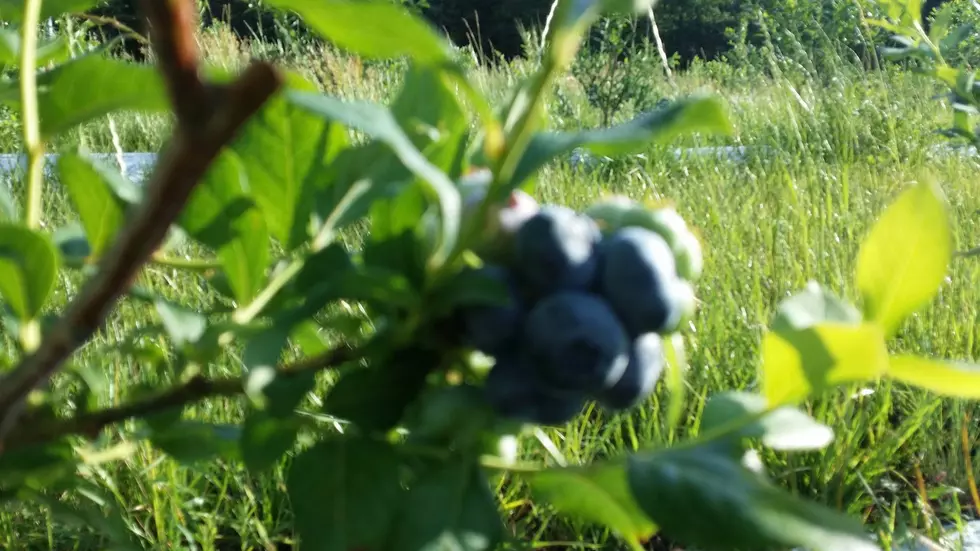
Jersey Blueberries turn 100 and is cause for celebration
This month marks the 100th anniversary of the centennial Blueberry market in New Jersey which after-all is the official state fruit. The cause for celebration is filled with delicious history and even greater detail into why they are so fascinating.
"There a crop that grow in our native soils," said Manny Pereria, owner of Brookville Farms in Barnegat. "They don't really require a whole lot of specialized what we call nutrient management or surreal amendments."
New Jersey of course is known as the "Garden State" and that nickname certainly may play homage to the crops or vegetation grown throughout the state.
The blueberry like any other type of fruit or vegetable grown needs a special type of care to make it taste so good.
"They grow very good in sandy acidic soils," said Pereria. "As a matter of fact it helps them with their color and their size being the rite PH soil that you begin with."
He adds his soils show a consistent pattern of what is needed to grow a quality blueberry.
"We did implement some USDA cost share for micro-drip irrigation which is a newer style of growing blueberries," adds Pereria. "We use orchard tubing and some pressure regulators that allows us to use as little water as possible and when needed which is important."
The ground they grow their berries on seems to be on historical ground and this could have a greater impact on the Jersey blueberry market which Pereria already has a new project mapped out.
"We actually have two properties in the Barnegat area that the blueberries have been in existence since the early 1900's," said Pereria.
But before embarking on the project any farmer must have a good eye for detail and science of the fields.
"When you go into a piece of overgrown field which has successfully been taken over by woodlands and be able to identify these blueberry plants which again are 100 and some odd years old," adds Pereria.
He says they need to be cultivated and cut back so they can have some light and space by reducing the canopy like trees then irrigated, many of which are already in that shape.
"Our forefathers didn't have the type of irrigation methods that we use today," said Pereria. "They used flood irrigation through a series of locks and dams and put in coverts in different spillways to be able to control the flow of the water."
Blueberries require very clean water he adds with a specific type of PH level needed to make them grow.
"We are involved in an irrigation management program through USDA which we monitor how much water we use, (and) which days we irrigate," said Pereria. "We monitor rainfall and of course we're constantly testing the soil levels and the water PH."
The water has such a significant impact on what we as individuals can or can't do on a daily basis but it also has an effect on how these fruits grow and live.
"We have good water in this area," adds Pereria. "Traditionally that's why blueberries and cranberries have been grown, the water is correct and hopefully it always will be."
There is a reason blueberries grow so well in New Jersey and why it is the official state fruit which dates back to a interesting Ocean County history as well.
"History tells me that Elizabeth White at Whitesbog sometime in the 1800's, her and her husband cultivated the modern day blueberry," said Pereria. "They were pretty much responsible for some of the varieties we have now."
Pereria adds on his farm they grow about 15 different kinds of blueberries, some of which he credits to being "direct descendants of her work".
Farming around some of nature's critters also plays a role in how and where blueberries are grown.
"One problem in especially blueberry farming is the introduction of invasive species of insects," adds Pereria. "There's a real problem in New Jersey now with some different insects like the drosophila fly, which is a white spotted drosophila, which is imported from another country."
He adds Japanese beetles have also found "their way into the New Jersey Blueberry fields."
The blueberry depending on the time of the year could change shape, color and even texture and there is a reason or two for that.
"The different blueberries are genetically like anything else," said Pereria. "They have different genetics which are going to affect they way they taste and their size. Size is very much genetic."
But why do certain berries have such a variety of taste combing the human pallet?
"Taste is how the individual plant can uptake certain minerals and PH and nitrogen from the soil," said Pereria. "You have to watch they (blueberries) get their color. It will turn blue only when the plant is depleted of the nitrogen from around the plant that it takes up."
Pereria adds if you feed nitrogen to a blueberry, it would have a similar affect to a lot of other things in that it wouldn't ever turn blue but remain green in color.
As far as some strange things people have done with blueberries, he says he's heard of a blueberry and cucumber slushie.
Sound tasty? Let us know.
Brookville Farms is located at 511 Route 72 and is open Monday thru Sunday 10am until 7pm.
More From Beach Radio









